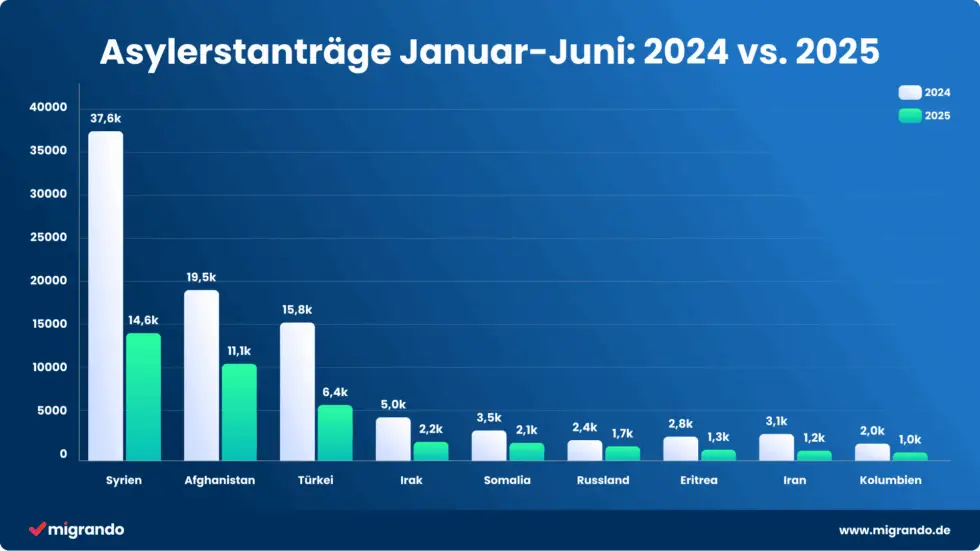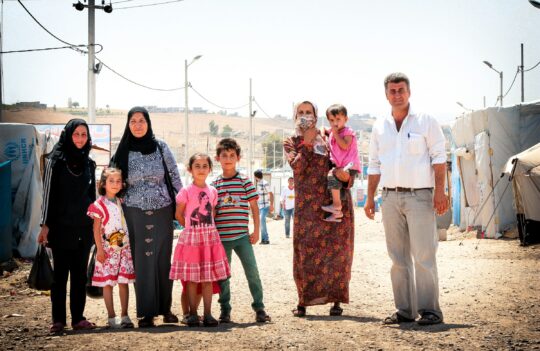Sharp decline in asylum applications from Syria
The decline in Syrian asylum seekers is particularly sharp: In the first half of 2025, only 14,633 Syrians applied for asylum in Germany - compared to 37,633 in the same period in 2024.
Domestic political developments in Syria are likely to be the main reason for this: Following the political upheaval resulting from the fall of ruler Bashar al-Assad in December 2024 , the security situation in several parts of Syria has changed. This opens up new options for many refugees, at least in theory.
Fewer applications from Afghanistan and Turkey too
There has also been a decline in asylum applications from other countries of origin: 11,139 initial applications were received from Afghanistan in the first half of the year - a decrease of 43 percent compared to 2024.
A total of 6,438 initial applications were registered from Turkey, which corresponds to a decrease of 59 percent. This means that Afghanistan is currently ahead of Syria as the top country of origin for asylum seekers in Germany.
Compared to 2024, the numbers from other countries of origin have also fallen sharply:
Tighter migration policy has an impact on asylum figures
In addition to international developments , political decisions in Germany also have an impact on asylum numbers. The then Federal Minister of the Interior Nancy Faeser had already introduced stationary border controls from fall 2023, which were extended to all national borders in the course of 2024.
Since May 2025, a decree issued by Federal Interior Minister Alexander Dobrindt (CSU) also allows asylum seekers to be turned back directly at the border - especially those arriving from so-called safe countries of origin.
According to information from the German Bundestag, there were almost 12,500 rejections at all German borders in the first four months of 2025. This figure rose sharply again from May onwards. How Die Zeit reports, citing the Potsdam police authority, 6,193 people were turned back at the borders in the two months after the new rules came into force alone.
Spain overtakes Germany in asylum applications
For the first time in years, Germany no longer has the highest number of asylum applications in Europe. As various media (including Welt am Sonntag) have reported, citing a previously unpublished report by the EU Asylum Agency (EUAA), Germany is now only in third place among EU member states with 61,336 initial applications - behind Spain (76,020) and France (75,428).
However, the number of asylum applications is also falling within the EU: A total of around 388,299 asylum applications were registered in the entire European Union (including Norway and Switzerland) in the first six months of 2025. This corresponds to a decrease of around 23% compared to the same period last year.
The shift in countries of origin is also striking: across the EU, most asylum seekers in the first half of 2025 came from Venezuela (48,413 applications), Afghanistan (41,127) and Syria (23,307). While Spain mainly accepts Venezuelan nationals, Germany remains the preferred destination country for asylum seekers from Afghanistan and Syria despite the decline.
Interior Minister Dobrindt: "Figures prove success"
The German government sees its asylum policy confirmed by the new figures. Interior Minister Dobrindt spoke of a "clear success" and announced his intention to consistently continue the course he has taken.
Since taking office, the German government has pursued a much stricter asylum and migration policy. The central measures include:
- Strict border controls: Interior Minister Dobrindt ordered stricter controls at all German borders at the beginning of May. In addition, asylum seekers can be turned back if they enter via a safe third country. There are exceptions for vulnerable groups such as pregnant women and children.
- Suspension of family reunification: At the end of June, the Bundestag passed a law suspending family reunification for people entitled to subsidiary protection for two years.
- Abolition of Naturalization naturalization: Naturalization after three years for particularly well-integrated persons is to be abolished. The corresponding bill is currently being discussed in the Committee on Internal Affairs. A decision is expected in September at the earliest.
- Expansion of safe countries of origin: On July 10, the government will introduce a bill in the Bundestag that will make it possible in future to classify countries of origin as safe without the approval of the Bundestag and Bundesrat. Asylum seekers from these countries would then no longer be entitled to asylum.
- Restricted legal protection: The same draft bill provides that asylum seekers in detention pending deportation or custody pending departure will no longer be entitled to legal assistance in future.
- Tighter regulations at EU level: The German government is also pushing for reforms at European level. In future, people seeking protection should also be able to be deported to so-called safe third countries - even if they have no family or personal ties there.











